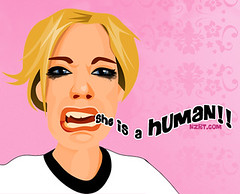
While we’re talking about celebrities, we can’t ignore the ones who
are the examples of what NOT to do. Nearly every day, it seems, there’s a new story about a celeb gone wrong: drug and alcohol abuse, drunk driving, “crazy” behaviors, teen pregnancy… It’s so easy for them to spiral out of control, and all too often, their addiction or untreated mental illness leads to tragic consequences.
But what about the celebrities who pull themselves out of that downward divebomb, who get into treatment and turn themselves around? They are the ultimate role models — people who finally admitted they had a problem and put in the hard, painful work to try to get their lives back. What a learning opportunity for regular people who may be going down that same path, though outside of the glare of the cameras. And how important it is to remember that once you take away the paparazzi, the money and the fans, celebrities are just people, and have the same emotional issues as the rest of us (maybe more).
Brian Dyak, President and CEO of the Entertainment Industries Council (EIC), wrote a passionate defense of celebrities who go through rehab on EIC’s relatively new blog, Getting Reel About Art and Life (thanks to Melissa Havard for the pointer). He writes:
…But I do have one ax to grind. I’m bugged by a lot of comments I’ve heard—and articles I’ve read—about celebrities going into rehab.With 25 years of experience bridging the entertainment and health industries, I am uniquely qualified to respond to the finger-pointing, poking, prodding, lens clicking and tittering that surround celebrity rehab.
And I’ve got something to say.
First and foremost, the celebrity rehab we read about is not a joke for people’s amusement. Thanks to our newly tabloid-driven pop culture, we—and our children—have unprecedented access to what addiction and mental illness look like. Britney Spears, Amy Winehouse, Lindsay Lohan and over two dozen other people gained headlines in 2007 for entering addiction recovery centers.
These are lives at risk, out of control, not jokes, and not reality television shows taking place on the streets of Hollywood for public amusement. If we pay attention, we can see complex stories unfolding before our eyes. One of EIC’s primary principles is to be non-judgmental and respect creative freedom afforded in our great nation. For those who judge mental health, making judgment on these people’s lives, I ask:
Who the hell are you?
Do you think you are better than these people? Stronger? Smarter?
Give me a break.
Addiction and mental health issues affect every cross-section of our population. If you’re laughing now at Britney Spears, will you be laughing in five or ten years when, heaven forbid, your niece, uncle, sister, brother, even your mother or your own son or daughter loses control of his or her life? Will it be funny then?
This new access to the private lives of celebrities who face constant scrutiny and challenges unimaginable by most people—and is a double-edged sword. On one hand, it exposes us to the waking nightmare that losing control of one’s life can be, but on the other hand, it has opened dialogue about addiction and mental illness that has, until now, been hush-hush. While I, like most of America, am truly worried about Britney Spears’s health and safety, I am glad to say I have witnessed a national shift from bemused fascination with her spontaneous antics to recognition of her condition as critically ill, and a new awareness of the real point of rehabilitation: to get better.
VH1’s Celebrity Rehab with Dr. Drew, A&E’s Intervention, HBO’s Rehab—these are important, revolutionary shows that serve the public in a unique and valuable way. The insights just might help someone, and that is good.
Taking steps to fight and beat the struggles that come along with addiction, being self honest with oneself and ideally healthier is a process not unlike walking through a maze blindfolded. And the good news is, a whole lot of folks find a valuable piece of themselves that they never knew existed in the process. Some make it to the betterment of their own lives, the lives of families, friends, and society.
So the next time you get a peek into the lives of Britney, Lindsay, Mel Gibson, Kirsten Dunst, Pat O’Brien, Eva Mendes, Marc Jacobs, Jesse Mefcalfe, Eddie Van Halen, Amy Winehouse and others, be thankful for what you’ve got and respect them for seeking help rather than looking down on them for having real problems. If their stories make you query your own actions, consider following their good example and ask for help. Thanks to new public attention to the recovery process, which can include relapses, we must stop mocking and start understanding…
Well said.
Graphic Credit: Nazaret
Technorati Tags: britney spears, lindsay lohan, amy winehouse, celebrity, rehab, addiction, eic

 Nedra helps nonprofits and public agencies create positive change on health and social issues through social marketing and transmedia storytelling strategies at Weinreich Communications since founding the company in 1995. She helps organizations make a difference for the populations they serve by strategically designing programs that draw on state-of-the-art behavior change techniques, digital media approaches and the power of stories.
Nedra helps nonprofits and public agencies create positive change on health and social issues through social marketing and transmedia storytelling strategies at Weinreich Communications since founding the company in 1995. She helps organizations make a difference for the populations they serve by strategically designing programs that draw on state-of-the-art behavior change techniques, digital media approaches and the power of stories. 
I think you are right, it makes for a great role model when celebrities do recover. The really difficult part of the publicity celebrities get while trying to recover is that for as much good as it does when they do recover there is a greater and opposite reaction when they stumble or struggle with difficulties. Many people tend to hang on to the negative and say recovery doesn’t work. When in reality there are millions of people who do recover from the devastating effects of alcohol and drug abuse.
Chris Shumow
Executive Director
http://visionsteen.com
866.889.3665
Good point. Somehow, it seems that a lot of people have gotten “immune” to the whole drug addiction- drug rehab issue because they’re bombarded with images of celebrities dealing with it from the media. People tend to forget that such a matter is a very serious thing and is not at all easy. Not even for those celebrities who seem to have everything. Kudos to those who have successfully recovered!